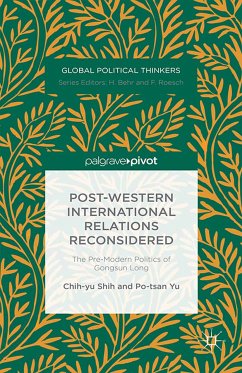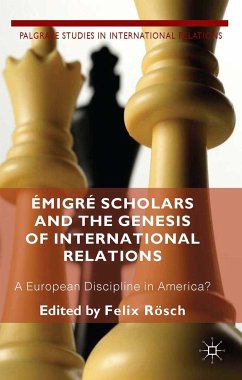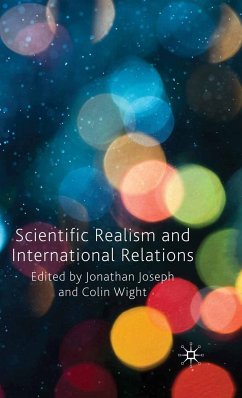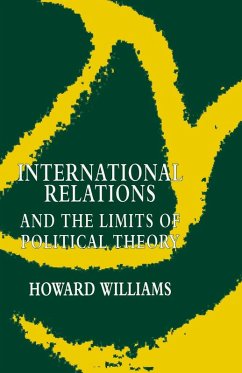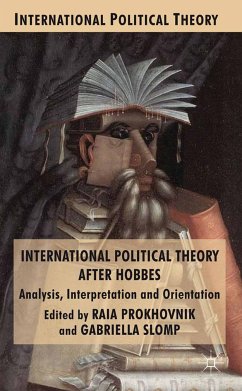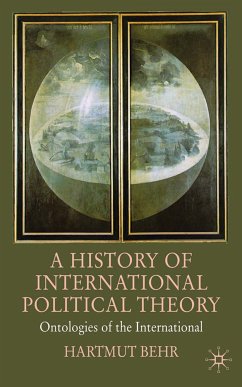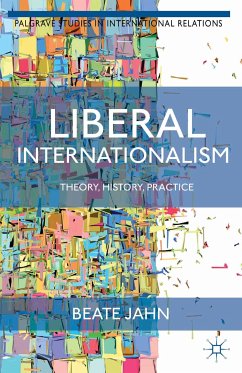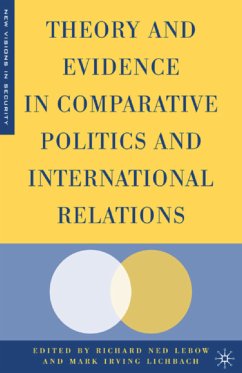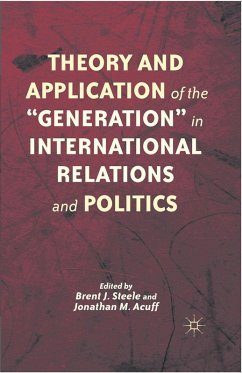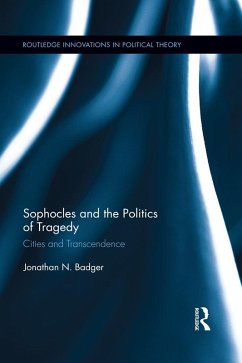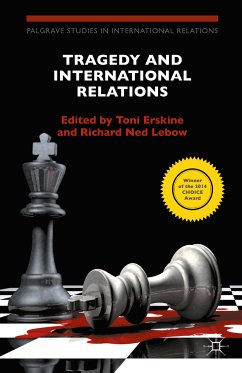
eBook, PDF
Tragedy and International Relations (eBook, PDF)

PAYBACK Punkte
20 °P sammeln!






Nowhere are clashes between competing ethical perspectives more prevalent than in the realm of International Relations. Thus, understanding tragedy is directly relevant to understanding IR. This volume explores the various ways that tragedy can be used as a lens through which international relations might be brought into clearer focus.
Dieser Download kann aus rechtlichen Gründen nur mit Rechnungsadresse in A, B, BG, CY, CZ, D, DK, EW, E, FIN, F, GR, HR, H, IRL, I, LT, L, LR, M, NL, PL, P, R, S, SLO, SK ausgeliefert werden.
TONI ERSKINE holds a Personal Chair in International Politics at Aberystwyth University, UK, and is currently Honorary Professor of Global Ethics at RMIT University in Melbourne and Visiting Scholar at Sydney University, Australia. RICHARD NED LEBOW James O. Freedman Presidential Professor of Government (Emeritus) at Dartmouth College, USA, and Centennial Professor of International Relations at The London School of Economics and Political Science, UK.
Produktdetails
- Verlag: Palgrave Macmillan UK
- Seitenzahl: 222
- Erscheinungstermin: 29. März 2012
- Englisch
- ISBN-13: 9780230390331
- Artikelnr.: 45972298
Winner of the CHOICE Award for Outstanding Academic Titles in 2014
"This is scholarship done the "old" way: a polite but nonetheless raucous debate, begun in a cafe, that subsequently gains a life of its own as it spreads and catches the interest of many fine thinkers and erudite writers. The goal of this short but deep volume, to discuss how and in what ways the classical conceptions of tragedy over the millennia of philosophical musings might still be relevant and enrich readers' understanding of international relations today, is fascinating exactly because it is so almost absurdly bold: one is hard-pressed to find a similar work with a similarly humble yet grand objective. In the end it is not so much about whether or not the
"This is scholarship done the "old" way: a polite but nonetheless raucous debate, begun in a cafe, that subsequently gains a life of its own as it spreads and catches the interest of many fine thinkers and erudite writers. The goal of this short but deep volume, to discuss how and in what ways the classical conceptions of tragedy over the millennia of philosophical musings might still be relevant and enrich readers' understanding of international relations today, is fascinating exactly because it is so almost absurdly bold: one is hard-pressed to find a similar work with a similarly humble yet grand objective. In the end it is not so much about whether or not the
Mehr anzeigen
contributors pull off the ultimate conclusion (after all, is it really possible in the present-day academic world to ever grant a person or a group success In answering what is at its most fundamental essence a deeply profound and highly esoteric question?), but rather it is a treat to enjoy this for the intellectual journey on which it takes the reader. It is a deeply serious work worthy of high-level reflection. Summing Up: Highly recommended." - CHOICE Review, M. D. Crosston, Bellevue University, USA
"As both rhetoric and reality, the question of tragedy remains a crucial aspect of political life and political understanding. With remarkable breadth and power, this superb volume shows why it should be central to political science and international relations today." - Michael C. Williams, Professor in the Graduate School of Public and International Affairs, University of Ottawa, Canada
"An unusual collection of stimulating essays amounting to a spirited "conversation" among leading scholars, which reminds us that the "bounds of sense" are not exhausted by "techniques", "designs", "systems" or "theories"." - Friedrich Kratochwil, Professor of International Relations, European University Institute, Florence, Italy
"Erskine and Lebow bring together a world class collection of contributors to demonstrate how the theme of tragedy illuminates the ethical contours of international politics. This books makes a valuable contribution to IR theory but will resonate well beyond this audience to scholars working in cultural studies, literature and continental philosophy. This is certainly a book I will be encouraging my students to read." - Kimberly Hutchings, Professor of International Relations at the London School of Economics and Political Science
"This is a wide-ranging collection of essays by an impressive group of established and early-career theorists." - International Affairs
"As both rhetoric and reality, the question of tragedy remains a crucial aspect of political life and political understanding. With remarkable breadth and power, this superb volume shows why it should be central to political science and international relations today." - Michael C. Williams, Professor in the Graduate School of Public and International Affairs, University of Ottawa, Canada
"An unusual collection of stimulating essays amounting to a spirited "conversation" among leading scholars, which reminds us that the "bounds of sense" are not exhausted by "techniques", "designs", "systems" or "theories"." - Friedrich Kratochwil, Professor of International Relations, European University Institute, Florence, Italy
"Erskine and Lebow bring together a world class collection of contributors to demonstrate how the theme of tragedy illuminates the ethical contours of international politics. This books makes a valuable contribution to IR theory but will resonate well beyond this audience to scholars working in cultural studies, literature and continental philosophy. This is certainly a book I will be encouraging my students to read." - Kimberly Hutchings, Professor of International Relations at the London School of Economics and Political Science
"This is a wide-ranging collection of essays by an impressive group of established and early-career theorists." - International Affairs
Schließen
Für dieses Produkt wurde noch keine Bewertung abgegeben. Wir würden uns sehr freuen, wenn du die erste Bewertung schreibst!
Eine Bewertung schreiben
Eine Bewertung schreiben
Andere Kunden interessierten sich für


